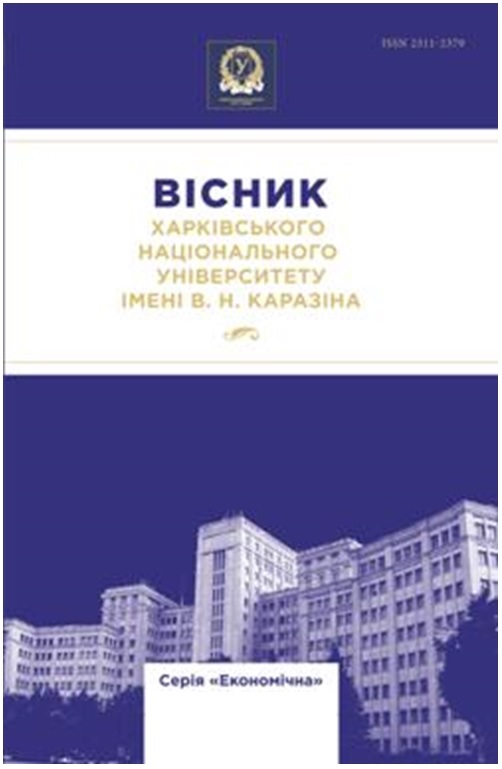Інституційне середовище відтворення соціальної нерівності
Анотація
У статті розглянуто інституційне середовище відтворення соціальної нерівності на основі закордонних та вітчизняних досліджень. Проаналізовано інституційні умови реалізації зменшення соціальної нерівності в трансформаційній економіці. Вивчено питання ролі соціальних інститутів при формуванні теперішнього стану соціальної нерівності. Тому простежено напрямок переходу фокусу соціально-економічних досліджень на інституційні складові соціальної нерівності у різних країнах. Поняття соціальної стратифікації піддається новій інтерпретації з урахуванням факторів інституційного устрою для відображення процесів стратифікації.
Основна увага приділялася виявленню впливу на формування та відтворення соціальної нерівності з боку соціальних інститутів, тому науковцями були проведені порівняльні дослідження. Найбільше зосереджувались на вивченні взаємозв’язку соціальної нерівності та факторів інституційного середовища. Таким чином, сформувався перелік інституційних відносин, які здатні встановити основні параметри соціальної нерівності в суспільстві, а також характеризують відмінності глибини та динаміки нерівності в різних економічно розвинених країнах.
Однією з запропонованих гіпотез є теорія владних ресурсів, яка говорить, що зменшення ролі інституційних капіталомістких (влада і власність) акторів можливо тільки за умови потужного впливу з боку найманих працівників. Набула популярності гіпотеза «медіанного виборця» у країнах з пропорційною виборчою системою. Вона передбачає, що більша нерівність ринкового розподілу доходів призведе до збільшення рівнів перерозподілу з боку держави в разі зростання нерівності.
Значна увага у вивченні інституційних чинників соціальної нерівності приділяється такому соціальному інституту, як професійні спілки. Профспілки являються впливовими учасниками процесу розподілу оплати праці, гарантами соціальних виплат, а також здатні досить дієво впливати на найманих працівників.
Важливу функцію соціалізації, передачу знань виконує інститут освіти. Також він виступає одним з основних каналів зв’язку між стратифікованою системою соціальних позицій та індивідами різного соціального походження і здібностей. При аналізі функціонування інституту освіти, основна увага зосереджена на доступності всіх рівнів освіти для дітей різного соціального походження, а також їх успішності в навчанні.
Завантаження
Посилання
Kenworthy L. Inequality and Sociology / Lane Kenworthy // American Behavioral Scientist. – 2007. – V. 50. – № 5. – P. 584–602.
Myles J. Who gets what and why? Answers from sociology / John Myles and Karen Myers // American Behavioral Scientist. – 2007. – V. 50. – № 5. – P. 578–583.
Smith M. Income Inequality and Economic Growth in Rich Countries: A Reconsideration of the Evidence / Michael Smith // Current Sociology. – 2002. – V. 50. – № 4. – P. 573–593.
Глущенко О.В. Добробут як імператив суспільного розвитку України / О.В. Глущенко // Економічний часопис-ХХІ – 2016. – №156(1-2). – C. 31-36.
Социальное неравенство и публичная политика / Ред. кол.: Медведев В.А. (отв. ред.), Горшков М.К., Красин Ю.А. – М.: Культурная Революция, 2007. – 336 с.
Database–Eurostat [Electronic resource]. – Accessed mode: http://ec.europa.eu/eurostat/data/database.
The World Bank [Electronic resource]. – Accessed mode: http://www.worldbank.org/.
Асемоглу Д. Институты как фундаментальная причина долгосрочного экономического роста / Д. Асемоглу, С. Джонсон, Д. Робинсон // ЭКОВЕСТ. – 2006. – Вып. 5, №1. – С. 4-43; Вып. 5, №2. – С. 248-287.
Економічна і соціальна політика в умовах конституційної реформи: стан і тенденції: аналітична доповідь // Національна безпека і оборона. – 2015. - №12. – С. 3-27.
Soskice D. Inequality and Redistribution: A Unified Approach to the Role of Economic and Political Institutions / D. Soskice, T. Iversen // Revue économique. – 2011. –vol. 62, № 4. – Р. 629-650.
Kenworthy L. Inequality, public opinion and redistribution / L. Kenworthy, L. McCall // Socio-Economic Review. – 2008. – № 6. – P. 35-68.
Raffalovich L. The power of property in comparative perspective / L. Raffalovich, E. Vesselinov // Research in Social Stratification and Mobility. – 2004. – Vol. 20. – P. 361-384.
Кругман П. Кредо либерала / П. Кругман – М. : Европа, 2009. – С. 368.
Esping-Andersen G. Untying the Gordian Knot of Social Inheritance /G. Esping-Andersen // Research in Social Stratification and Mobility. – 2004. – Vol. 21. — P. 115–138.

